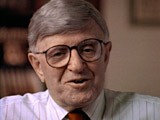You searched for: Deportation jews from germany to poland
<< Previous | Displaying results 231-240 of 263 for "Deportation jews from germany to poland" | Next >>
-
William (Bill) Lowenberg describes Zionist and cultural activities in the Westerbork camp
Oral HistoryAs a boy, Bill attended school in Burgsteinfurt, a German town near the Dutch border. After the Nazis came to power in Germany in January 1933, Bill experienced increasing antisemitism and was once attacked on his way to Hebrew school by a boy who threw a knife at him. In 1936, he and his family left Germany for the Netherlands, where they had relatives and thought they would be safe. However, after Germany invaded the Netherlands in May 1940, antisemitic legislation--including the order to wear the Jewish…

-
Bella Judelowitz
ID CardBella, born Bella Hirschorn, was raised in a Jewish family in the Latvian town of Kuldiga. When she was a young woman, Bella moved to the small town of Aizpute, where she met and married Daniel Judelowitz. Together they opened a bakery-grocery in the town. In the 1920s they moved to Liepaja and opened a dry goods store. The couple had 10 children, one of whom died in infancy. 1933-39: The Judelowitzes' store sold fabric and various clothing items and accessories from buttons to shirts and stockings. After…
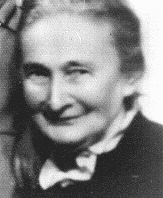
-
Daniel Judelowitz
ID CardDaniel was born to a Jewish family in the Latvian town of Aizpute. There, Daniel met and married Bella Hirschorn and together they opened a bakery-grocery in the town. In the 1920s they moved to Liepaja, on the Baltic coast, and opened a dry-goods store. The couple had 10 children, one of whom died in infancy. 1933-39: The Judelowitzes' store sold fabric, accessories and various clothing items from buttons to shirts and stockings. After Daniel and Bella retired, their daughters took over the business. In…
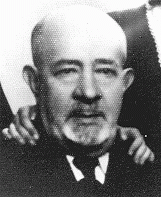
-
Alexander Bernstein
ID CardAlexander was one of six children born to a Jewish family in the Lithuanian village of Karchai. His father was a farmer. In nearby Janova, Alexander attended public school and also studied Hebrew and Jewish history in a religious school. In 1925 Alexander moved to Siauliai to attend secondary school. He lived there with his older sister. 1933-39: Alexander enrolled in university in Kovno, and entered the pharmacology department. After completing his degree, he returned to Siauliai and took a job in a…
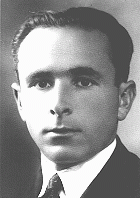
-
Auschwitz Camp Complex
ArticleAuschwitz was the largest camp established by the Germans. It was a complex of camps, including a concentration camp, killing center, and forced-labor camp.
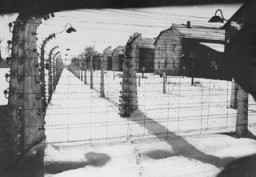
-
How and why did ordinary people across Europe contribute to the persecution of their Jewish neighbors?
Discussion QuestionMany Europeans witnessed acts of persecution, including violence against Jews and, later, deportations. While few were aware of the full extent of the Nazi "Final Solution," this history poses difficult and fundamental questions about human behavi...
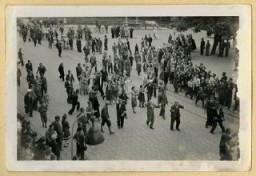
-
Siegfried Halbreich describes arrival at and brutality in the Gross-Rosen camp
Oral HistoryAfter Germany invaded Poland on September 1, 1939, Siegfried fled with a friend. They attempted to get papers allowing them to go to France, but were turned over to the Germans. Siegfried was jailed, taken to Berlin, and then transported to the Sachsenhausen camp near Berlin in October 1939. He was among the first Polish Jews imprisoned in Sachsenhausen. Inmates were mistreated and made to carry out forced labor. After two years, Siegfried was deported to the Gross-Rosen concentration camp, where he was…
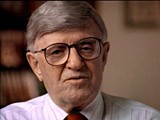
-
Siegfried Halbreich describes conditions in the Sachsenhausen camp
Oral HistoryAfter Germany invaded Poland on September 1, 1939, Siegfried fled with a friend. They attempted to get papers allowing them to go to France, but were turned over to the Germans. Siegfried was jailed, taken to Berlin, and then transported to the Sachsenhausen camp near Berlin in October 1939. He was among the first Polish Jews imprisoned in Sachsenhausen. Inmates were mistreated and made to carry out forced labor. After two years, Siegfried was deported to the Gross-Rosen concentration camp, where he was…
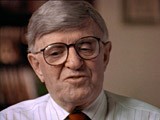
-
Sam Itzkowitz describes forced labor in the Makow ghetto
Oral HistoryThe Germans invaded Poland in September 1939. When Makow was occupied, Sam fled to Soviet territory. He returned to Makow for provisions, but was forced to remain in the ghetto. In 1942, he was deported to Auschwitz. As the Soviet army advanced in 1944, Sam and other prisoners were sent to camps in Germany. The inmates were put on a death march early in 1945. American forces liberated Sam after he escaped during a bombing raid.
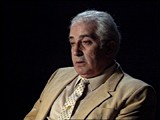
-
Siegfried Halbreich describes treatment of prisoners in the Sachsenhausen camp
Oral HistoryAfter Germany invaded Poland on September 1, 1939, Siegfried fled with a friend. They attempted to get papers allowing them to go to France, but were turned over to the Germans. Siegfried was jailed, taken to Berlin, and then transported to the Sachsenhausen camp near Berlin in October 1939. He was among the first Polish Jews imprisoned in Sachsenhausen. Inmates were mistreated and made to carry out forced labor. After two years, Siegfried was deported to the Gross-Rosen concentration camp, where he was…
